
Recorded conversations and interviews on electronics design and manufacturing with the editors of PCD&F/Circuits Assembly, brought to you by the Printed Circuit Engineering Association (PCEA)
Recorded conversations and interviews on electronics design and manufacturing with the editors of PCD&F/Circuits Assembly, brought to you by the Printed Circuit Engineering Association (PCEA)
Episodes

Monday Sep 23, 2024
PCB Chat 135: Duncan Haldane of JITX
Monday Sep 23, 2024
Monday Sep 23, 2024
JITX is a San Jose-based developer of PCB design automation tools. The company's novel platform takes design concepts and convert them into schematics, circuit design, and component placement, among other features.
Duncan Haldane, CEO and cofounder, talks with Mike Buetow about the JITX platform, which proposes to rethink and simplify the way electronics are designed by using common language instead of machine code to realized complex ideas as a product design, overcoming legacy technology, and working on the desktop instead of the cloud.
And (teaser alert), listen for an announcement about the premiere PCB Design Community event taking place on October 9 at PCB West at the Santa Clara (CA) Convention Center.
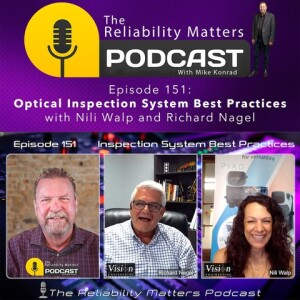
Tuesday Sep 17, 2024
RM 151: Optical Inspection System Best Practices
Tuesday Sep 17, 2024
Tuesday Sep 17, 2024
Two episodes ago, in RM 149, we talked all about automated optical inspection. Today we're exploring the impact of less automated inspection Technology, that being optical microscopes.
From commercial, class 1 electronics to high-reliability class 3 electronics, the intricate electronic devices we rely on daily are assembled with astonishing precision. This precision wouldn't be possible without the aid of advanced optical microscopes. These remarkable instruments allow technicians and engineers to inspect, analyze, and ensure the quality of electronic components down to the minutest detail.
In this episode, we'll uncover how optical microscopes have impacted electronic assembly, enhancing productivity, ensuring reliability, and driving innovation.
One of the unique benefits microscopes provide, particularly in hand soldering applications, is the ability to view and solder the assembly under high magnification through the microscope. Obviously, this is not something any AOI system can perform.
But microscopes are not limited to soldering applications. One of the most critical applications of optical microscopes in the electronic assembly industry is the inspection of circuit assemblies for quality assurance. Circuit assemblies are the heart of many products, comprising numerous, highly miniaturized components and connections that must be flawlessly integrated. Even the smallest defect, such as a microscopic crack or an improperly soldered joint, can lead to significant malfunctions or failures.
Optical microscopes enable detailed inspection of these assemblies, allowing quality control professionals to identify and rectify issues that would be invisible to the naked eye.
By providing high-resolution images and magnification, these microscopes help in detecting defects, ensuring correct alignment and polarity of components, and verifying the integrity of solder joints. This meticulous inspection process is crucial for maintaining the reliability and performance of electronic devices, ultimately ensuring customer satisfaction and, in many cases, safety.
We'll hear from two industry experts who will share insights on the latest technological advancements and how these tools are indispensable in maintaining the high standards of modern electronics. Nili Walp is marketing manager at Vision Engineering, a manufacturer of microscopes design for various industries, including the Electronics assembly industry, where she has worked for over eight years. Walp earned a bachelor's in communications from Boston University.
Richard Nagel is vice president of sales and marketing at Vision Engineering where he has worked for over 21 years. Nagel and Walp will share insights on the latest technological advancements and how these tools are indispensable in maintaining the high standards of modern electronics.
Chapters:
00:00:00 - Impact of Optical Microscopes on Electronic Assembly
00:02:18 - Latest Technological Advancements with Industry Experts.
00:04:49 - Vision Engineering's Origins and Innovations
00:07:40 - The Invention of the Boroscope
00:09:57 - The Importance of Magnification in Electronics Assembly
00:12:34 - Advancements in Microscope Technology
00:15:07 - The Game Changer in Microscopy: Eyeless Microscopes
00:17:34 - Ergonomic Advancements in Microscopy
00:20:06 - Advancements in Microscope Technology
00:22:29 - Applications of Microscope Technology
00:24:56 - Types of Microscopes in the Biological Sciences Industry
00:27:38 - Microscope Applications and Considerations
00:30:20 - The Value of Human Intuition in Inspection
00:33:06 - Common Challenges in Microscopy
00:35:52 - Illumination for Surface Texture
00:38:30 - Common mistakes when purchasing microscopes
00:40:59 - Choosing the Right Microscope for Your Needs
00:43:35 - Microscope Illumination Techniques and Considerations
00:45:57 - Practical Magnification Levels in Electronics Industry
00:48:23 - Purchasing the Right Microscope
00:50:58 - Vision Goggles in Virtual Reality and Augmented Reality
00:53:43 - Demand for Technological Advancements in Younger Generations
00:56:19 - Ergonomics and Productivity in the Workplace
00:58:47 - Learn more about reliability matters podcast
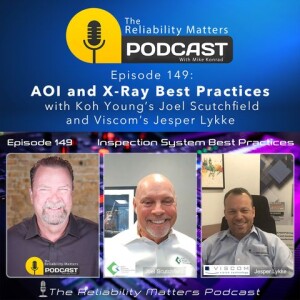
Thursday Aug 15, 2024
RM 149: AOI and X-Ray Best Practices
Thursday Aug 15, 2024
Thursday Aug 15, 2024
In today's episode, we're exploring automated optical inspection (AOI) and x-ray inspection technology within the electronics assembly industry.
Joining Mike Konrad are two experts who bring a wealth of knowledge and experience to the table.
Joel Scutchfield is general manager of SMT and Semicon business operations & director of sales at Koh Young, manufacturers of automated inspection and precise measurement systems with its headquarters in Seoul, South Korea, and R&D centers around the world. Scutchfield has been with Koh Young for just under 10 years.
Jesper Lykke is CEO at Viscom, a manufacturer of inspection technologies, in particular for AOI and x-ray inspection, with headquarters in Hanover, Germany and offices worldwide. Lykke has been with Viscom for 14 years.
Both Scutchfield and Lykke are widely considered subject matter experts on inspection technology.
In this episode, we'll delve into the principles and applications of AOI and x-ray inspection, discussing how these technologies are revolutionizing the electronic assembly industry. We'll explore the latest trends, challenges, best practices, and future directions, providing you with a comprehensive understanding of how these inspection methods are critical to maintaining high standards in electronics manufacturing.
Whether you're an industry professional, a tech enthusiast, or just curious about the intricacies of electronic assembly, this episode promises to offer valuable insights and expert perspectives on the inspection technologies that are driving both innovation and quality in the field. So, sit back, relax, and join us for an enlightening conversation about inspection technology.

Wednesday Aug 07, 2024
PCB Chat 134: Zachary Feuerstein on Supply Chain Management
Wednesday Aug 07, 2024
Wednesday Aug 07, 2024
Zachary Feuerstein founded his latest venture in 2022 after running into problems purchasing basic white goods and consumer electronics due to the post-Covid supply chain disruptions.
That company, Breadboard, was officially launched with the very modest goal of revolutionizing the electronics supply chain management industry.
Designed to automate and expedite BoM processing, optimize component spend, and automate quoting processes, the Breadboard platform now boasts more than 60 EMS customers.
Feuerstein joins PCB Chat host Mike Buetow to explain the platform and his "Eureka" moment.

Tuesday Jul 30, 2024
RM 149: SMTA International 2024
Tuesday Jul 30, 2024
Tuesday Jul 30, 2024
Just like the famous line from the 1984 film, The Terminator, “I’ll be back,” SMTAI is back.
Back to the Chicago area. We’re back in Rosemont, co-located with the Assembly Show, at the Donald E. Stephens Convention Center, October 20-24.
Between SMTAI and the Assembly Show, there will be thousands of engineers and industry professionals in attendance. The exhibit floor features hundreds of exhibitors showing off the latest technology. But the topic we're discussing today is the technical conference and other planned events taking place at this year’s SMTAI.
This year, there are 11 scheduled professional development courses, about 100 technical presentations across seven technical tracks.
Joining Mike Konrad to discuss what’s in store for attendees is Jason Keeping, member of the SMTA Board where he is vice president of technical programs for SMTA. Jeff Kennedy, past SMTA president and director of the Manufacturing Excellence track, and Robert Boguski, member of the SMTA board where he is VP of membership and director of the Test and Inspection track.
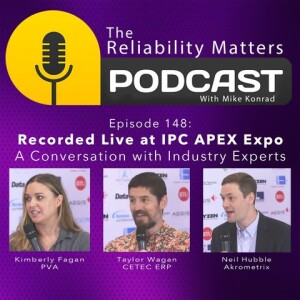
Wednesday Jul 24, 2024
RM 148: IPC Apex Special (Part 3 of 3)
Wednesday Jul 24, 2024
Wednesday Jul 24, 2024
This episode of Reliability Matters features three interviews including:
• Kimberly Fagan from PVA
• Taylor Wagan from CETEC ERP
• Neil Hubble from Akrometrix
Recorded live in Anaheim, CA, during IPC Apex Expo.
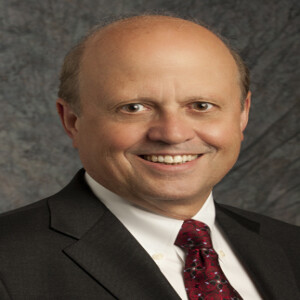
Monday Jul 15, 2024
PCB Chat 133: Wally Rhines on the PCB Design Software Market
Monday Jul 15, 2024
Monday Jul 15, 2024
Wally Rhines returns to give the latest data and analysis on the printed circuit board and MCM design software market, and the broader electronic design automation market.
Rhines comments on the quarterly data released by the ESD Alliance, shifts in demand from India and China, seasonal buying trends, employment and more.
This episode is sponsored by PCB Way, celebrating its 10th anniversary as a leading supplier in electronics manufacturing, known for high-quality PCB prototypes and assembly services.
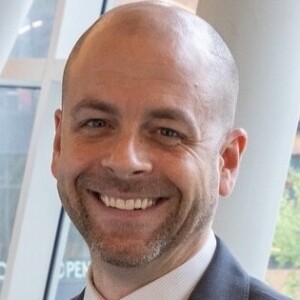
Friday Jul 12, 2024
Friday Jul 12, 2024
The CHIPS Act has hogged much of the oxygen in the tech industry for the past few years, but the industry trade group known as the Printed Circuit Board Association of America is trying to build on that momentum by relentlessly pointing out that the board industry needs love too, or as they put it, chips don't float. With us today is David Schild, the executive director of the PCBAA.
Schild and Mike Buetow discuss the prospects of pending Congressional legislation to support the US PCB industry, the need for domestic substrate and bare board production to complete the triad of the semiconductor "stack," and a just-announced Commerce Department plan to allocate up to $1.6 billion in funding to support the packaging supply chain.
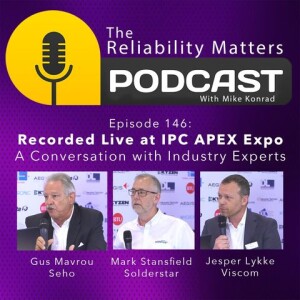
Wednesday Jun 26, 2024
RM 146: IPC Apex Special: Soldering and Inspection
Wednesday Jun 26, 2024
Wednesday Jun 26, 2024
Recorded live during IPC Apex Expo this spring, this is the first of three podcasts from the show floor.
This episode features three interviews including:
• Gus Mavrou from Seho
• Mark Stansfield from Solderstar
• Jesper Lykke from Viscom
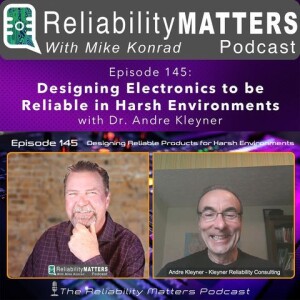
Tuesday Jun 18, 2024
RM 145: Designing Electronics to be Reliable in Harsh Environments
Tuesday Jun 18, 2024
Tuesday Jun 18, 2024
The challenging world of electronics becomes even more challenging when the end product is destined for harsh environments. For high-reliability products operating in a harsh environment, the quest for reliability is not just a goal—it's an imperative. These are not your everyday gadgets; often they're critical components of systems designed to operate under extreme conditions, where failure is not an option. From the scorching heat of desert landscapes to the unyielding cold of arctic tundra, from the high-pressure depths of our oceans to the radiation-filled expanse of space, the demands on these electronic products are as varied as the environments themselves.
While ocean depths, outer space, and frozen tundra are arguably harsh environments, we don’t have to look too far for examples of product failures in less harsh environments. One example that comes to mind is the state of public EV charging stations. Government reports have concluded that up to 25% of public EV chargers are at any given time. While there are many reasons for this, one may conclude they are not designed and manufactured for the intended in climactic operating environment.
On this episode, we'll uncover the numerous challenges that designers and engineers face in their quest for reliability, durability, and functionality of the final product. As we navigate through this complex landscape, we'll highlight the strategies that enable these products to not just survive but excel in unforgiving conditions.
Our navigator for this episode is, Dr. Andre Kleyner. Dr. Kleyner has 30 years of engineering, research, consulting, and managerial experience specializing in reliability of electronic and mechanical systems designed to operate in severe environments. He received a doctorate in mechanical engineering from the University of Maryland, and a master's of business administration from Ball State University. Dr. Kleyner is a Global Reliability Engineering Leader with Delphi Electronics & Safety and an adjunct professor at Purdue University. He is a Fellow of the American Society for Quality (ASQ), a Certified Reliability Engineer, Certified Quality Engineer, and a Six Sigma Black Belt. He also holds several US and foreign patents and authored multiple professional publications including two books on the topics of reliability, statistics, warranty management, and lifecycle cost analysis.
